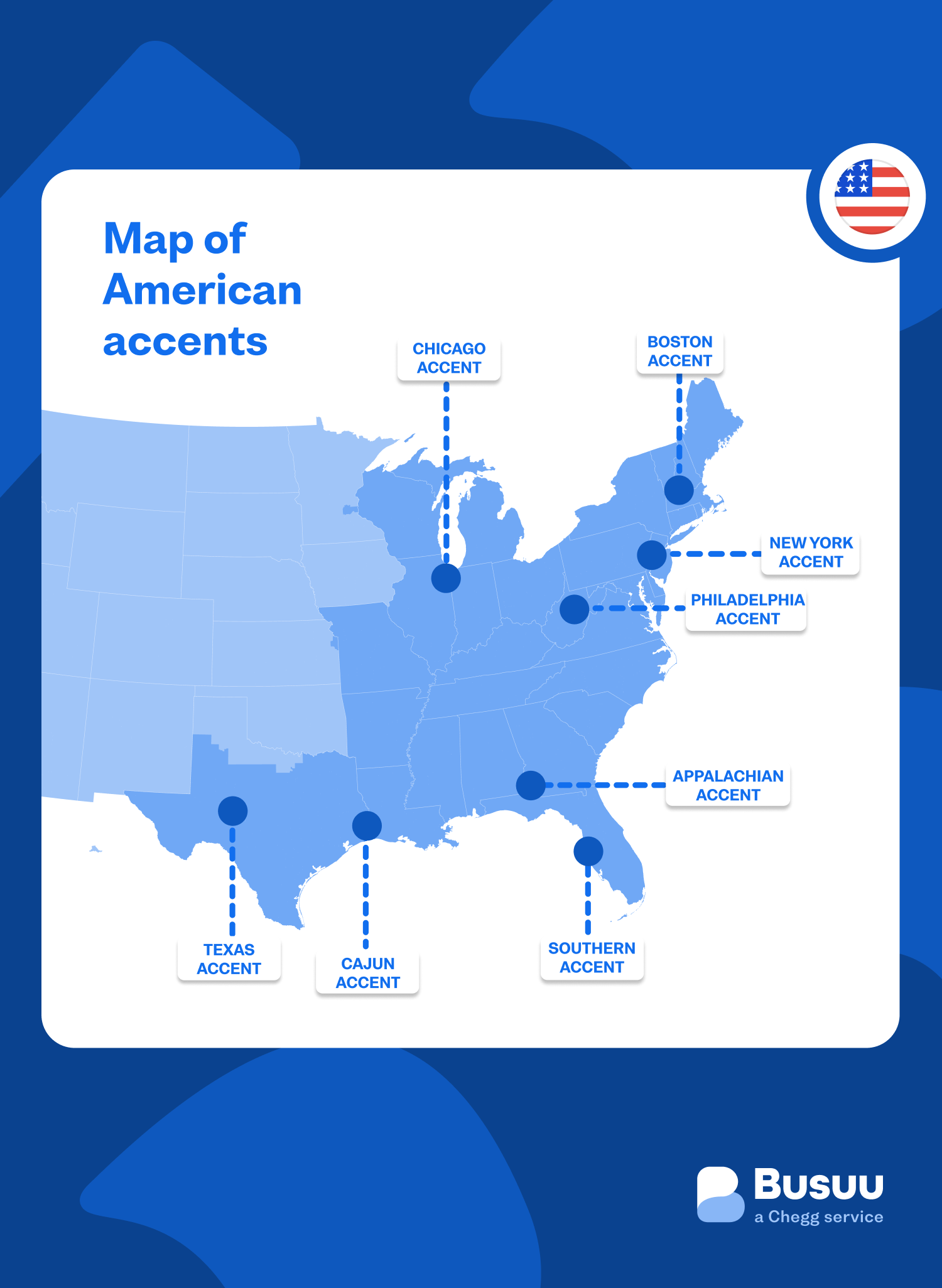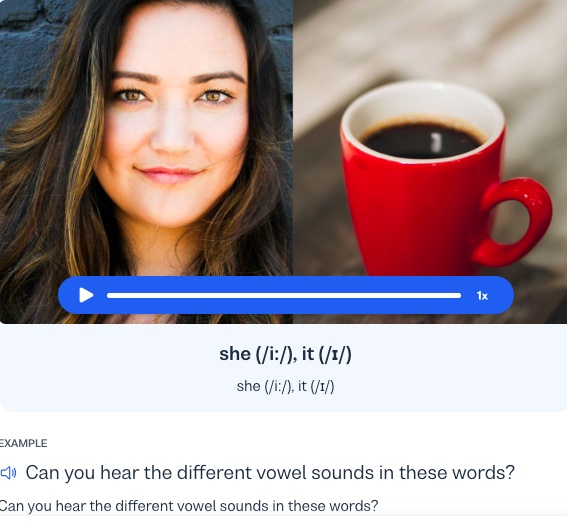American Accent: A Guide to Sounding More American
Learn about American accents and get some practical tips to apply to your English language learning.
I want to learn...
In the USA, people come from all over the world so it’s no surprise that there are tons of regional accents. You’ve all heard the General American accent — it’s the main accent used in the mainstream media. But what about the interesting local accents in the USA?
In this article, you’ll learn all about the General American accent, and some unique regional accents. You’ll also get some tips to help you improve your English pronunciation.
The evolution of the American accent
American English started when the British introduced the English language in North America in the 1600s. At first, American and British accents were the same (they were the same people). But when the industrial revolution happened, American accents started to develop. People started dropping r-sounds, which they still do today.
Regional American accents
The USA is full of interesting accents and dialects, each with unique characteristics reflecting the history, culture, and people of its region. The standard accent in the USA is the General American accent. When you turn the news on, most likely you’ll hear this because it’s common in the media and broadcasting. It’s a neutral accent which means that although it’s clearly an American accent, it’s impossible to pinpoint a particular location. Check out this video and listen to the General American accent.
Here are some of the most notable regional accents in the USA (with video clips so you can hear the real thing):

1. New York accent
In the bustling streets of the Big Apple, you'll find the New York accent. The locals often drop their r-sounds, and the city's famous “coffee” sounds more like "caw-fee" — o-sounds becoming or-sounds is a common feature of New York accents. Check out this video and listen to the classic New York accent.
2. Southern accent
Further down south, the Southern accent has a characteristic drawl and longer vowel sounds. For example, the ai-sound in “like” sounds closer to a long a-sound like in “father”. These slower and longer sounds give the Southern accent a laid-back feeling. Listen to the Southern accent in this video.
3. Boston accent
Bostonians have their unique way of speaking, too, where they drop r-sounds (like most British accents). Thanks to the city's unique vowel and consonant sounds and r-sound dropping, the Boston pronunciation of “park” is a famous example of their accent. Listen to the Boston accent in this video.
4. Texas accent
The Texas accent shares many similarities with the Southern accent. There’s a similar drawl and long vowel sounds. In Texas, ai-sounds also sound like the vowel in “father”. The e-sound in words like “pen” changes so the word sounds more like “pin” too. Check out this video and listen to the Texan accent.
5. Chicago accent
The Chicago accent is another distinctive big-city accent. People there also drop r-sounds. But there are some unique features. Th-sounds become d-sounds. So, “this” sounds more like "dis". And short o-sounds become short a-sound. For example, “hot dog” sounds like "hat dag". To get to know more about the Chicago accent, check out this video.
6. Philadelphia accent
Philadelphia is another northeastern city with an interesting accent. But unlike New York and Boston, people in Philadelphia say r-sounds. Philadelphians have a unique way of pronouncing their vowels and consonants.
T-sounds are more like d-sounds, for example. Philadelphians are famous for how they say “water”. Because of their pronunciation of t-sounds, and their unique way of saying the vowel sound in “water”, it sounds more like "wooder". Listen to the Philadelphia accent in this video.
7. Appalachian accent
Nestled in the mountains, the Appalachian region has a unique accent influenced by the Scots-Irish immigrants. It shares many similarities with Southern and Texan accents. It has a drawl and ai-sounds are the same.
There are other interesting characteristics: ei-sounds like in “bait” can sound more like ai-sounds. And e-sounds — like in the word “bed” — are long and drawn out sounding like "bay-ud. Listen to the Appalachian accent in this video.
8. Cajun accent
Down in Louisiana, the Cajun accent is a blend of French and Southern English. You might hear phrases like "laissez les bon temps rouler" which means "let the good times roll" down there.
There are unique pronunciations too. In Cajun English, people often follow French stress patterns. So words that have stress on the first syllable in English, might have stress on the second syllable in the Cajun accent
Another common feature is switching th-sounds for d-sounds. So “father” sounds more like "fadher". Finally, unlike most accents in the south, the Cajun accent drops r-sounds. Listen to the Cajun accent in this video.
Boost your pronunciation with these tips
Let’s take a look at some tips to help you perfect your English pronunciation:
Focus and being clear and easy to understand
Let’s get straight to the point: You don’t need native-like pronunciation to be a good communicator. You need to be clear and easy to understand — that’s it.
Who cares if you speak English with a Russian accent? Not your listeners. They only care about being able to understand you. Your accent is a huge part of you so don’t hide it. And don’t feel pressured to sound like a native English speaker.
Listen and imitate
Listen attentively to native speakers, paying close attention to the rhythm, intonation, and stress patterns of their speech. Spend time copying what you hear. For example, take a short scene from an American TV show. Try to say the same thing the characters say, in the same way. Record yourself. Listen back. And see how similar you are to the original.
Keep practicing until you get it right. But also start introducing the American accent into your own speech.
Bonus tip: You can use Busuu’s Video Bites to hear native speakers speak about a variety of topics. Listen to them and try to copy the speakers’ pronunciation.
Practice consistently
Regular and consistent practice will help you master pronunciation, Speak, read aloud, and sing songs. The more you do this, the more you’ll understand the rhythm. Repetition will train your mouth muscles and you’ll get better at producing the natural sounds.
Get feedback
Interact with native speakers and ask them for feedback about your pronunciation. Busuu has a community of millions of language learners and native speakers (many of them with American accents) who will be happy to help.
You can improve your English pronunciation
There are tons of regional American accents, each with its own unique characteristics. They’re interesting to learn about, but you don’t need to speak in these accents. As a language learner, you should focus on being as clear and easy-to-understand as possible. There’s no need for you to have native pronunciation.
To improve your pronunciation, add listening and speaking practice to your language learning. Practice consistently and follow the tips in this article to take your pronunciation to the next level.
Master English pronunciation today!
With Busuu, you're just a few swipes away from everything you need to master English pronunciation. Listen to real-life English, practice with and get feedback from native speakers, and complete free online courses.

